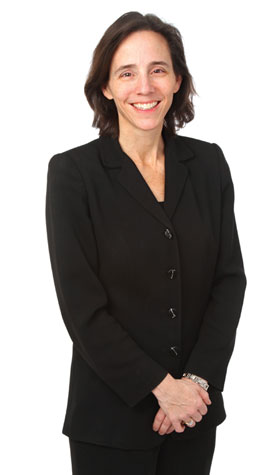by Patrick McSparin // Spring 2012
Catherine Spong, M.D.
Alumna of the Year
As chief of Pregnancy and Perinatology at the National Institute of Child Health & Human Development (NICHD), Catherine Spong (M.D. ’91), oversees nearly $100 million in grants and contracts. But don’t think she’s just a numbers person. Spong has made important breakthroughs in Down syndrome and fetal alcohol syndrome, she leads the NICHD’s Maternal Fetal Medicine Units Network, and she serves as a textbook and periodical editor—all while mentoring students and researchers.
“I want to communicate the concept that optimal pregnancy outcomes will translate to better health of women and children, and ultimately the entire nation,” Spong says. “Studies have shown that babies who are born small have higher rates of disease later in life, such as earlier onset of heart disease, diabetes and even some cancers. If we can optimize the prenatal environment and improve the outcome of pregnancies, we may be able to prevent these conditions. Many healthcare dollars and research efforts center on identifying and treating adult diseases. If we focused on improving pregnancy outcomes, we would have an ideal preventive strategy.”
Has science always been a passion? Yes. My parents encouraged me to enter science fairs beginning in kindergarten.
What do you consider your greatest achievement? I have helped further women’s health, but it’s my children—Juliana, Winston and Genevieve—who are my greatest achievements.
What traits do you value in a colleague? Integrity, because without it nothing else matters, but also fairness, honesty, hardworking, dependable, kind, caring, considerate and a good sense of humor.
What historical figure do you most identify with? Ignatz Philipp Semmelweis, the physician who discovered that washing hands significantly reduced maternal deaths in obstetrics. And Marie Curie, both for her role as a talented woman physicist and chemist, and for her pioneering research on radioactivity that changed medical care.

